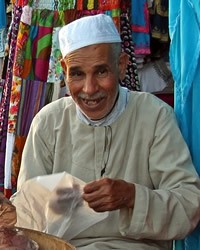Arab, Moroccan in Türkiye (Turkey)

Photo Source:
Monica Volpin - Pixabay
|
Send Joshua Project a map of this people group.
|
| People Name: | Arab, Moroccan |
| Country: | Türkiye (Turkey) |
| 10/40 Window: | Yes |
| Population: | 17,000 |
| World Population: | 31,513,800 |
| Primary Language: | Arabic, Moroccan |
| Primary Religion: | Islam |
| Christian Adherents: | 0.00 % |
| Evangelicals: | 0.00 % |
| Scripture: | New Testament |
| Ministry Resources: | Yes |
| Jesus Film: | Yes |
| Audio Recordings: | Yes |
| People Cluster: | Arab, Maghreb |
| Affinity Bloc: | Arab World |
| Progress Level: |
|
Introduction / History
Arabs represent the largest, most diverse, and most politically influential Muslim ethnic grouping in the world. While there are several characteristics that determine if a person is a true Arab, one trait is always evident: a proud sense of being an Arab. The early Islamic period was a time when "Arab identity" meant that all Arabs had descended from a common male ancestor. Thus, being an Arab brought recognition, honor and certain privileges. Their physical, geographical and religious aspects all vary greatly.
However, the ability to speak Arabic (or an Arabic dialect) and identification with the Arabian cultural heritage are, perhaps, the two most essential elements. Though political unity is still a dream among Arabs, the Arabic language remains the greatest common tie. Attempting to preserve their original language, Arabs have maintained two basic forms of Arabic, though each Arab country has their own dialect. The first is "classical Arabic," the religious and literary language spoken and written uniformly throughout the Arab world. The second is "colloquial Arabic," the informal spoken language which varies by dialect from region to region. Both forms are used by educated Arabs. Arabs are the majority people in many countries in the Arabian Peninsula, the Maghreb, and all of North Africa including Morocco and Algeria. However, they aren't as dominant in Western Sahara. With rapid fire speed, the Arabs conquered this region and spread Islam throughout, though there is still a remnant of traditional Christians among Arabs. They made it as far west as Morocco, and the "Arabs" in that region are a blended with the indigenous Berbers, both culturally and linguistically. Like other Arabic dialects, Moroccan Arabic is not understandable to other Arabs, largely because of the Berber influence.
Today Moroccan Arabs are living in many countries including Turkey, although they are more likely to be found in European countries. Those in Turkey are most likely to live in Istanbul or Antalya.
What Are Their Lives Like?
In Turkey, Moroccan Arabs must adjust to a new culture and language. Some are common laborers while others own shops.
It is common for Moroccan Arabs to attend Turkey's fine universities. They seldom stay in the country for more than a couple of years. Moroccan businessmen invest in Turkey, a country that has a track record of relative stability.
What Are Their Beliefs?
Although some Moroccan Arabs hold onto ancient beliefs as well, they are officially Sunni Muslim like the Turkish majority. Most likely they attend the same mosques as the Turks.
What Are Their Needs?
Since Islam is ingrained in the identity of so many Moroccan Arabs, we need to pray that they put their identity in Christ, the sure foundation.
Prayer Points
Pray that God will raise up faithful intercessors who will stand in the gap for Moroccan Arabs in Turkey.
Pray that the softening of their traditional culture will soften their hearts so they will hunger for the truth and eagerly accept it when they hear it.
Pray for a church planting movement among Moroccan Arabic speaking people in Turkey that will show others the transforming power of the gospel in their lives.
Ask the Lord to raise up strong local churches and discipleship movements among Diaspora Arabs in Turkey.